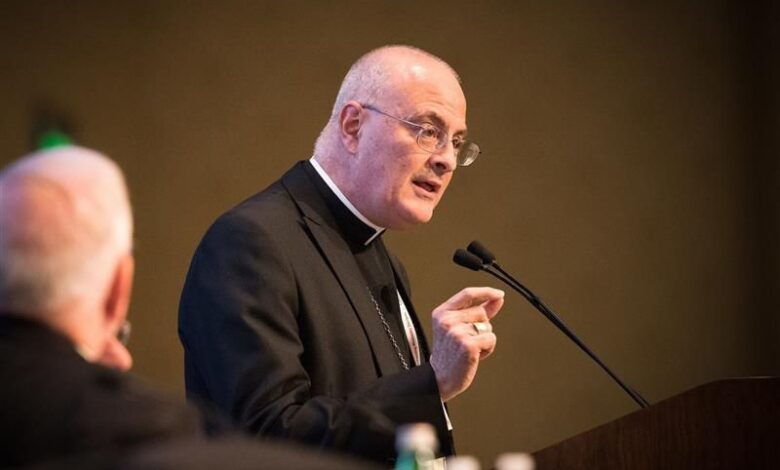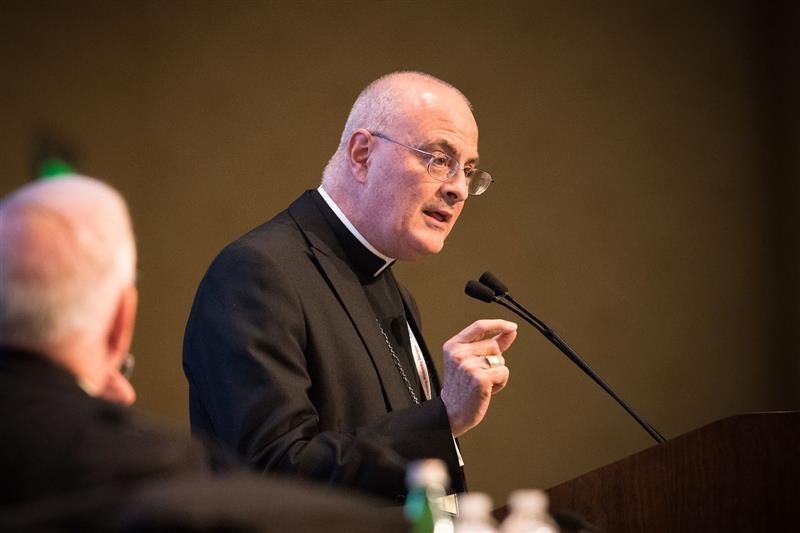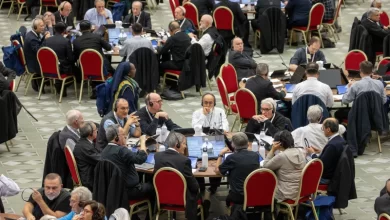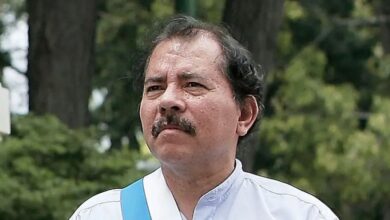Maronite bishop dives deep into the ‘masculine soul’

 Bishop Gregory Mansour released his sixth pastoral letter on men's spirituality on Oct. 12, 2023. / Credit: Eparchy of Saint Maron of Brooklyn
Bishop Gregory Mansour released his sixth pastoral letter on men's spirituality on Oct. 12, 2023. / Credit: Eparchy of Saint Maron of Brooklyn CNA Staff, Nov 23, 2023 / 10:38 am (CNA).
In his sixth pastoral letter on male spirituality, Maronite Bishop Gregory Mansour says that “fatherhood is expected of all men, whether biological, natural, or spiritual.”
In the Oct. 12 letter titled “The man of God is a man for others: Some themes in men’s spirituality,” Mansour, said that there are “some worrisome trends” in the culture that “undermine masculinity under the guise of remedying past chauvinism or over-reliance on patriarchal structures.”
Mansour added that given “the absence of dads in far too many homes in our country and the need for inspiring male role models, many young men are growing up without effective guidance about how to live out their male identity.”
Expressing the desire to reach the “hearts of men” through his letter, he added that “I would be grateful if this Pastoral Letter nourishes women and youth as well because so much of this letter can be helpful to everyone interested in the spiritual life.”
Pastoral letters are often released by bishops to members of their dioceses on a certain aspect of the faith, in an attempt to guide the faithful.
The letter explores a myriad of topics ranging from a man’s disposition towards his wife and children, the use of contraception and pornography, the need for self-mastery and a life of prayer, and the call to fatherhood for all men regardless of one’s current state in life.
“Men who live as ‘chips off the old (divine) block’ are the greatest need today; women and children long for this — many men also long for this,” he wrote.
‘A man for others’
Much of a men’s spirituality can be discovered through reflecting on Jesus as “a man for others,” the letter said.
Mansour cites the Gospel of John where Jesus washes the feet of his disciples. He adds that Jesus was teaching “all of us, but especially men” about servant leadership.
“Jesus wanted to teach men how to undo the sin of the first man, Adam, who after the Fall would ‘rule over’ his ‘helpmate’ Eve (Gen. 3:16),” he wrote.
Christ was making service “his privileged way,” Mansour wrote, adding that “the path of redemption would involve self-mastery rather than domination of others.”
Men and women have equal dignity, Mansour wrote pointing to Jesus’s discourse on marriage and divorce with the Pharisees.
Mansour wrote that Christ “rebutted the religious leaders of the day who were justifying divorce by referring to how Moses allowed a man to divorce his wife for any reason whatsoever.”
Jesus responded by stating “that it was God’s intention from the beginning that what God has joined no human authority should separate,” Mansour wrote, adding that his new command “shattered all previous rights to male domination in marriage.”
“Jesus, it should be noted, was speaking only to men, because women did not have the ‘right,’ given by Moses, to divorce their husbands. Thus, Jesus was indicating that a woman and a man are, by nature, and by the intention of the Creator, of equal importance and dignity,” he wrote.
The call to chastity
Noting that men and women are able to give themselves as gifts to each other in the sexual embrace, Mansour said that “a man and woman need to develop within themselves the virtues necessary to ensure that they can be faithful to each other.”
Mansour wrote that chastity orders sexual intimacy to be “appropriately expressed in fidelity, love, and mutual reverence,” adding that “man completes woman and woman completes man, as two halves make a whole.”
“We can easily enslave ourselves to our desires, passions, compulsions, addictions, and whims. Pornography, masturbation, and sexual promiscuity are always sinful, as is sexual harassment or abuse,” he wrote.
Mansour wrote that if one falls into any of these sins or crimes, “he should repent of these quickly, and ‘flee’ from them, saying that professional help may be necessary in some cases.
“We should all work to rid ourselves and the culture of such ills, to make our culture and ourselves, more holy, chaste, and respectful, especially for the sake of women, girls, and boys,” he wrote.
Mansour said that one way chastity can be used in marriage is through Natural Family Planning, a method of tracking a woman’s natural cycle which can help couples either conceive or avoid pregnancy.
“If a couple for serious reasons prayerfully recognizes the need to space children, they should not make recourse to contraception but work together to achieve a healthy spacing of children in the chaste and natural way given by God,” he wrote.
On the topic of children, Mansour said that God intended “these ‘little ones’” to enter the world in the context of the marriage covenant.
“A child has the right to come into the world through this kind of marital love, embrace, complementarity, and commitment, in which the mother and father mutually pledge to love and care for the child and each other in a stable and permanent relationship,” he wrote.
Turning his attention to the single and celibate man, Mansour wrote that these groups of men are also called to live chaste lives and deny themselves.
Mansour cited Pope John Paul II, who referred to the “nuptial meaning of the body,” adding that those who forsake marriage for the sake of the kingdom can live in a “spiritual union” with God.
“This gift, in imitation of the chaste and celibate Christ, depends on and deepens one’s communion with God, and sets one free to embrace an intense and life-giving love for others,” he wrote.
A man’s prayer
A prayerful man will learn that his life’s purpose is holiness, Mansour wrote. He added that men are called to make themselves vulnerable in prayer.
Mansour notes that it can seem “contradictory” for a man who is a “protector, provider, and cultivator” to become so vulnerable in prayer, but said that to “enter into a prayerful state requires a man to now go a step even further, and to stand vulnerable before another man, that is before the God-man, Jesus Christ, and ask him for help.”
But a man’s prayer is not just for himself, Mansour wrote, it is for “all those for whom he loves and cares.”
“A good father, husband, friend, priest, or consecrated man carries the responsibility to not only answer his call to holiness, but to also help bring others to holiness as well,” he wrote.
Fatherhood “is expected of all men,” regardless of their current state of life, Mansour wrote.
He wrote that all men, biological or not, are called to “natural” fatherhood, which is “a role in which a man teaches by example, providing proof that what the father teaches is possible in one’s life.”
The biological father is a “generator of life” that will “go on to nurture other generators of life,” he wrote.
“Thus, the biological father ‘passes on the torch’ allowing his sons the potential to take on the same name, ‘father.’ Fatherhood does not end with the generation of new life, but rather the perfection of this new life through proper rearing, education, and accompaniment,” Mansour wrote.
A natural fatherhood calls a man “to showcase a virtuous life that embodies a lifestyle worthy of imitating,” he wrote.
“Whether one is both a biological and natural father or only a natural father, both roles are ordered to an even greater level of fatherhood: spiritual fatherhood. This is a fatherhood expected of all men of goodwill, focused on accompanying one’s loved ones through this temporal, earthly journey while keeping their eyes fixated on eternal life,” Mansour wrote.
The full 15-page letter can be read here.





